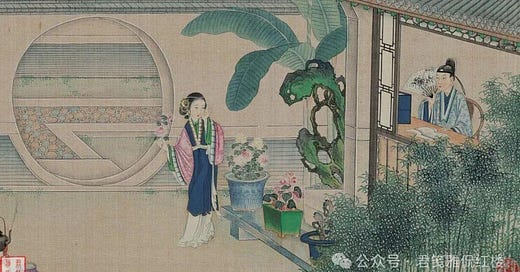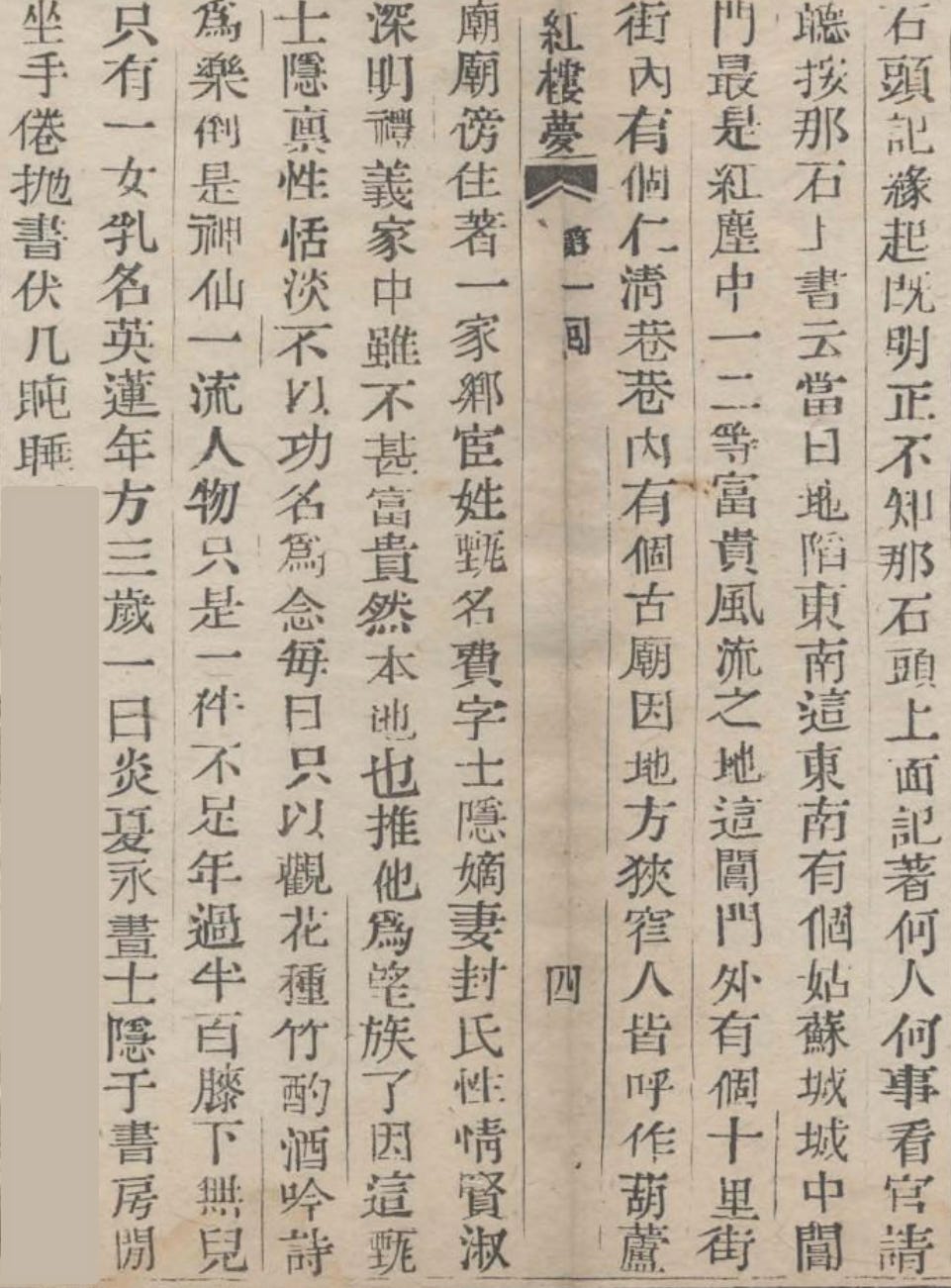The Retired Scholar
After two weeks worth of translation posts, we’re finally getting to an actual human character. Today we will meet Zhen Shiyin, the man with a cryptic and symbolic name we first saw mentioned way back in the first paragraph. This post is a bit short, however, because we’ll be back to symbolism and philosophy with our next translation post.
Chinese Text
《石頭記》緣起既明,正不知那石頭上面記著何人何事?看官請聽:
按那石頭上書云:當日地陷東南,這東南有個姑蘇城,城中閶門,最是紅塵中一二等富貴風流之地。這閶門外有個十里街,街內有個仁清巷,巷內有個古廟,因地方狹窄,人皆呼作「葫蘆廟」。廟旁住著一家鄉宦,姓甄,名費,字士隱,嫡妻封氏。性情賢淑,深明禮義。家中雖不甚富貴,然本地也推他為望族了。因這甄士隱稟性恬淡,不以功名為念,每日只以觀花種竹、酌酒吟詩為樂,倒是神仙一流人物。只是一件不足:年過半百,膝下無兒,只有一女,乳名英蓮,年方三歲。
一日,炎夏永晝,士隱於書房閒坐,手倦拋書,伏几盹睡。
Translation Notes
姑蘇城 refers to the modern day Suzhou.
閶門 actually was the name of a gate in Suzhou. However, 閶 might refer to one of two homophones: 昌 “prosperous, flourishing,” or 娼, which refers to women entertainers, prostitutes, and here would stand for “hedonism” or “dissipation.”
十里, the name of the street, is a homophone here with 世理, “the ways of the world.”
仁清, the name of the lane, is a homophone here with 人情, “human sentiment.”
鄉宦 in this context refers to a “retired official,” where 鄉 refers to him returning to his hometown at the end of his official career. We can tell this is the case because of the things that Zhen Shiyin does with his time: he’s reading and tending the garden instead of governing.
Zhen Shiyin’s given name is revealed here: 甄費. 費 is an interesting name, since it means “waste” or “squander,” implying that he’s a decadent literatus who wasted his family fortune — or, when we remember that 甄 and 真 are homophones, “one who squanders truth.” Also, just as how 甄士隱 is a homophone with 真事隱 (true facts hidden), 甄費 is a homophone with 真非, either “false truth” or “truth and non-truth.” The given name 費 is a direct reference to the 真-假 (truth and falsehood) connection we keep seeing pop up — and is likely meant to remind us that what we see as “true” is not necessarily “true.”
Zhen Shiyin’s wife is surnamed 封, and no given name is specified. 封 itself means “seal” or “close,” and is a homophone with 風 “wind,” which refers to things transient, invisible, and uncontrollable — such as a sudden reverse in fortune. It’s also a homophone with 瘋 “crazy.”
嫡妻 means the “principle wife” or “first wife,” as opposed to concubines (妾).
賢淑 means “morally excellent” and refers to women in particular.
望族 means a distinguished family or a prominent family.
膝下 refers to children in general. 膝下無兒 (or 膝下無子) refers to having no son.
英蓮, Yinglian, literally means “Heroic Lotus.”
永晝 refers to a really long day, and originally comes from 醉花荫 by 李清照. The first line of the poem is “薄霧濃雲愁永晝,瑞腦銷金獸” which translates to “Light mists and heavy clouds – sorrow all the long day / Incense from the gold censer melts away.” The idea here is to show that the day felt unbearably long — and is connected with the sorrow that Zhen Shiyin is about to feel.
拋書 technically means to “throw away the book.” In this case, Zhen Shiyin is almost certainly dropping the book as he falls to sleep.
几 here means a table or bench, and survives in words like 茶几 (tea table). Though this is the same character as the simplified form of 幾, note that the character 几 in older Chinese refers specifically to a table and not to an uncertain number.
Translation Critique
Hawkes
Keep reading with a 7-day free trial
Subscribe to Dream of the Red Chamber to keep reading this post and get 7 days of free access to the full post archives.






